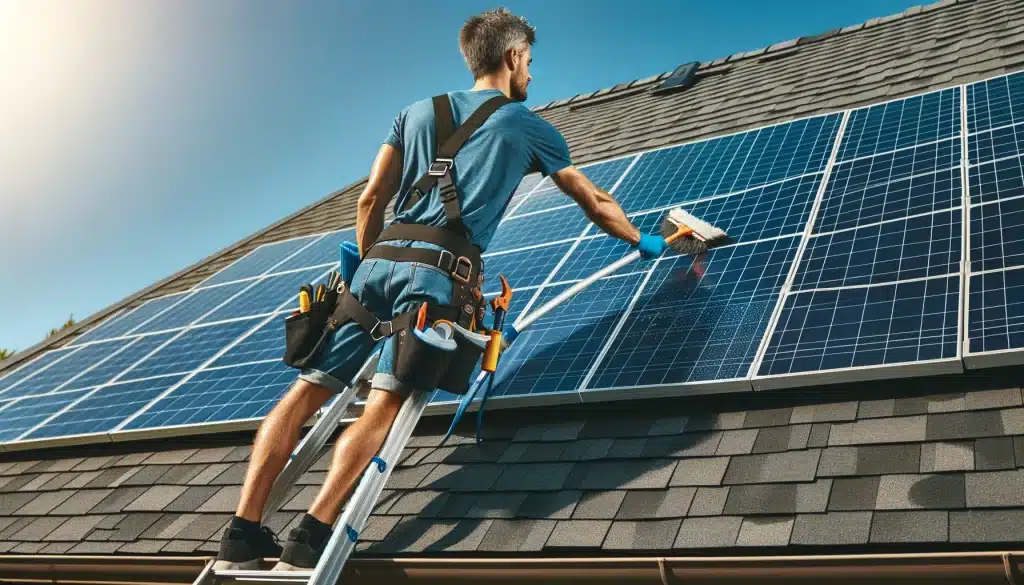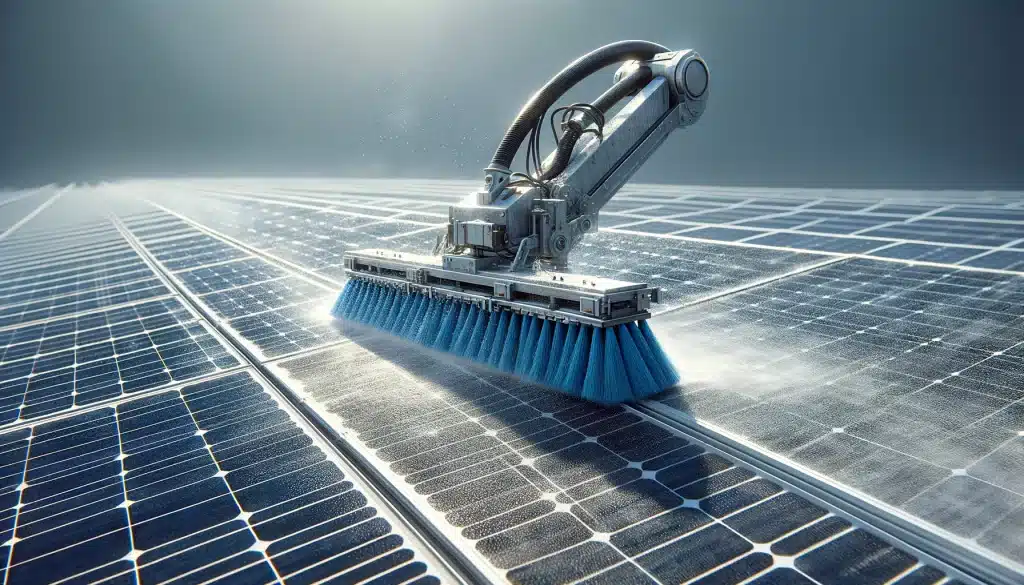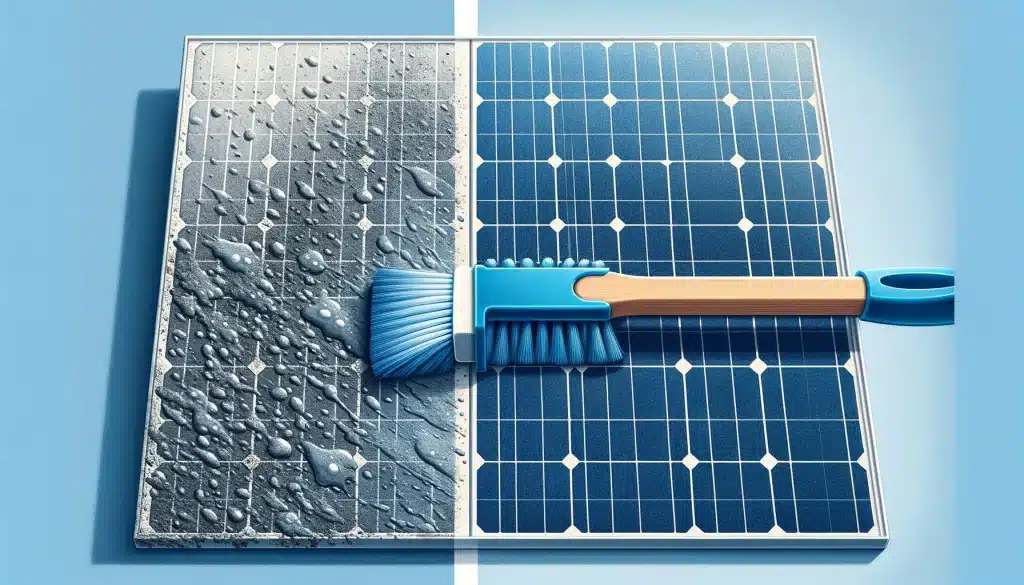Do you use solar panels to reduce your dependence on fossil fuels, and want to enjoy them for as long as possible? To maintain their optimum performance, good maintenance is essential. You can hire a professional to clean your solar panels, or you can do it yourself. In the latter case, remember to do it like a pro by following these few tips.

Why clean your solar panels?
If you've had time to look around on the internet to see how it's done, you probably already know that cleaning solar panels is a rather tedious task. So the idea of doing without may already have crossed your mind. Yes, you can let your solar panels work hard every day without cleaning them. But that's not the wisest decision, given that the investment they represented and the impact of dirt on their performance. That would be throwing your money out of the window, wouldn't you agree?

Solar panels are constantly exposed to various elements that can impair their efficiency: dust, leaves, pollen, bird droppings and even snow. This debris can block sunlight. Studies have shown that panels that are not cleaned undergo a loss of efficiency of up to 25%.
Dust and leaves can create shaded areas, reducing exposure to the sun on certain parts of the panel. Bird droppings and tree residues can be particularly problematic. They can adhere strongly to the panels, pile up and become difficult to remove without a professional intervention. These substances can also corrode solar panel materials, reducing their lifespan.
Regular cleaning ensures that your solar panels operate at their optimum level. It's also an essential step when you have a a successful, eco-responsible end-of-tenancy clean-up. This means they can generate more energy, which increases their profitability.
How do I clean my solar panels effectively?
Use the correct techniques to avoid damaging the panels. Cleaning must be carried out with respect for the materials.
Tools and products
Solar panels must be cleaned with care to avoid damaging sensitive surfaces. The use of specific tools and products ensures effective cleaning while preserving the integrity of the panels.
Here is a list of frequently recommended tools and products:
- Demineralised or osmosis water : The use of demineralised water is preferable to avoid limescale deposits and other water marks on the panels after drying.
- Soft brush or squeegee : A soft bristle brush or a squeegee with a rubber tip is ideal for gently scrubbing the surface of the panels without scratching them.
- Telescopic boom : To reach solar panels installed high up, a telescopic pole equipped with a soft brush allows you to clean without having to climb onto the roof.
- Low pressure sprayer : A sprayer allows water or a cleaning solution to be applied to the panels from a distance, avoiding the need for high water pressure which could damage the panels.
- Non-abrasive cleaning solution : If water alone is not sufficient to remove the dirt, a mild, non-abrasive, solvent-free cleaning solution can be used. It is important to check that the product is specifically designed to be safe for solar panels.
- Microfibre cloth : To remove residues or dry the panels after cleaning, a microfibre cloth is effective as it leaves no lint and does not damage the surface.

Avoid using abrasive chemicals, high-pressure water jets or metal sponges, which can damage the solar panels. Before using any cleaning product, consult the panel manufacturer's manual to make sure that the products and cleaning methods are compatible.
Cleaning frequency
The frequency with which solar panels need to be cleaned depends on a number of factors, such as their location, the degree of exposure to dirt, the local environment and the season. In general, annual cleaning is recommended, but certain situations may require more frequent cleaning:
- Dusty or desert environments : In areas prone to dust or sand, solar panels may need cleaning several times a year to maintain their efficiency.
- Areas with lots of leaves or pollen : If your panels are located near trees that lose their leaves or produce a lot of pollen, seasonal cleaning may be necessary.
- Regions with heavy rainfall : Although rain can help to clean panels naturally, in some areas this may not be enough to remove all the dirt build-up.
- Observation of the drop in performance : If you notice a reduction in the efficiency of your solar panels, this may indicate that cleaning is required.

If you still have it, consult the manufacturer's manual for specific recommendations. Consider installing a monitoring system to track the performance of your solar panels. Professional cleaning or the use of suitable equipment is recommended to avoid damaging the panels.
The benefits of professional cleaning
Have you considered entrusting the job to solar panel cleaning professionals? It might be a better idea if you're not equipped to do it yourself. Cleaning your solar panels regularly has a positive impact not only on their performance, but also on the environment and your wallet.

Expert hands to clean your solar panels
This task requires a certain amount of meticulousness and skill. precision in techniques. An expert company like Nettoyage Express has the equipment and knowledge to do just that. Specialists will take care of your solar panels. They have also been trained to detect potential faults that could affect the panels' performance. Thanks to these good cleaning practices, you can be sure that your solar panels will operate at full capacity for as long as possible.
A good deed for the planet
By maintaining a high level of efficiency, you maximise the renewable energy productionreducing your carbon footprint. Whether you choose to do it yourself or call in the professionals, a regular cleaning of solar panels is an investment that translates into :
- greater energy production
- financial savings
- a significant gesture in favour of the environment
Optimum energy production means savings on your electricity bills.

